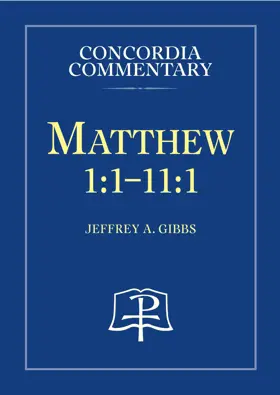

Matthew 1:1–11:1
Pages
547 pages
Publisher
Concordia Publishing House
Published
12/30/2006
ISBN-13
9780758603180
Reviews
Careful, faithful, detailed, pastoral. Dr. Gibbs' commentaries are the gold standard of commentaries on the book of Matthew. Each entry in this lengthy work shows a practical care to the text of Scripture which can only come from a lifelong study of Matthew's Gospel. He engages modern and ancient scholarship alike, while always having an eye to where Matthew points: the active rule and reign of Jesus Christ.
Professor Gibbs' commentary deserves to be high on this list. Two of three volumes have been published, and along with Luz's three-volume work this is one of the very best works on the first Gospel. Gibbs is such a close, careful reader of the text. Nothing goes unnoticed and nothing gets ignored. He also does an excellent job of connecting themes across the Scriptures and shows especial attention to Old Testament connections. The attention he gives to Hebrew words/concepts is very helpful. In everything, Gibbs also shows great concern for the Church and her preaching task, keeping Christ front and centre throughout this work.
Excellent and extremely thorough commentary. Gibbs never goes beyond what Scripture explicitly shares. Can't wait for the rest of his work.
St. Louis: Concordia, 2006. Pp. xxxvi + 547. Hardcover. $42.99. ISBN 0758603185. Charles L. Quarles Louisiana College Pineville, Louisiana The Concordia Commentary series is designed to assist pastors, missionaries, and teachers in conveying the message of the Scriptures with clarity and fidelity to the divine intent of the text. The commentaries are intended to be Christocentric, to expound the relationship between law and gospel, and to be based on a commitment that the canonical books of the Old and New Testaments are “the inspired and inerrant Word of God” (xi). The editors and authors of the series subscribe to the Book of Concord, the Lutheran confession of 1580. The author of this volume, Jeffrey A. Gibbs, is professor of exegetical theology (New Testament) at Concordia Seminary in St. Louis. He earned his Ph.D. at Union Theological Seminary, where he studied the Gospel of Matthew under Jack Dean Kingsbury. In his introduction, Gibbs classifies Matthew as a biography of Jesus that was intended to be read and heard in the context of public worship by a large audience in Syria and Palestine. Matthew saw his Gospel as completing the scriptural story by demonstrating that Jesus fulfilled the biblical narrative. Not only did Matthew see his Gospel as completing Scripture; he saw it as Scripture. Although he is fully aware of the complexity of the issues and the many possible options, Gibbs rejects the two-source hypothesis in favor of Matthew’s literary independence.
[Full Review]

